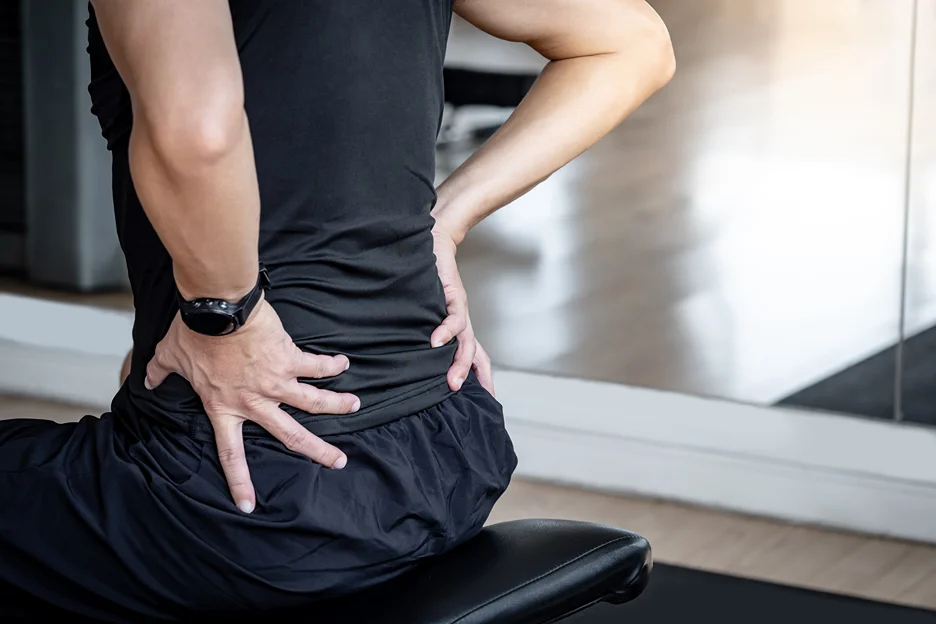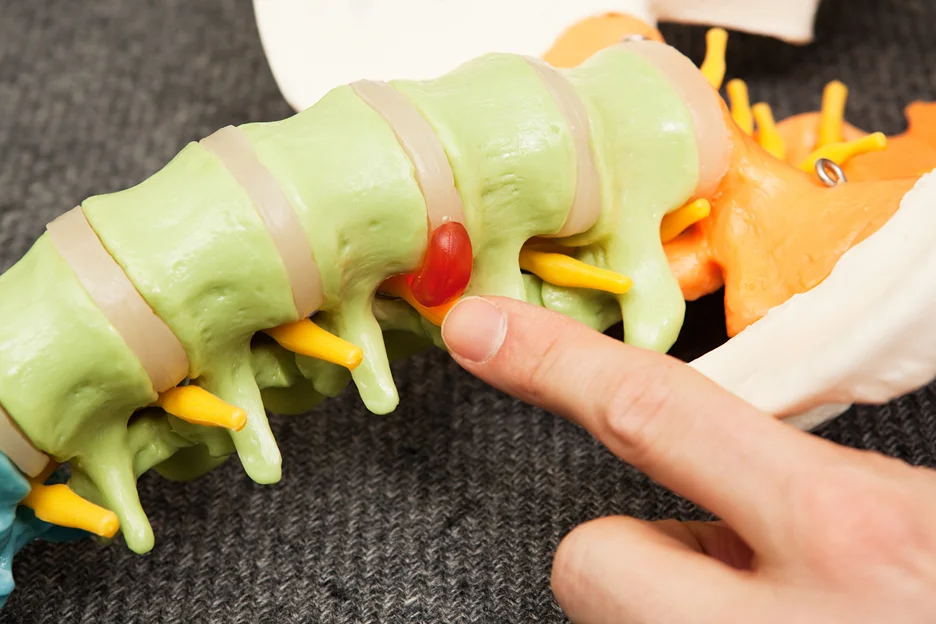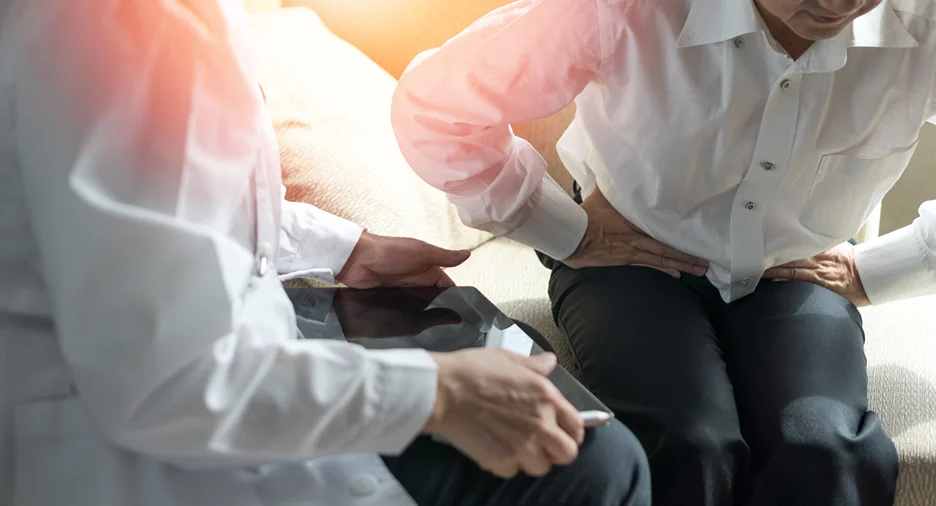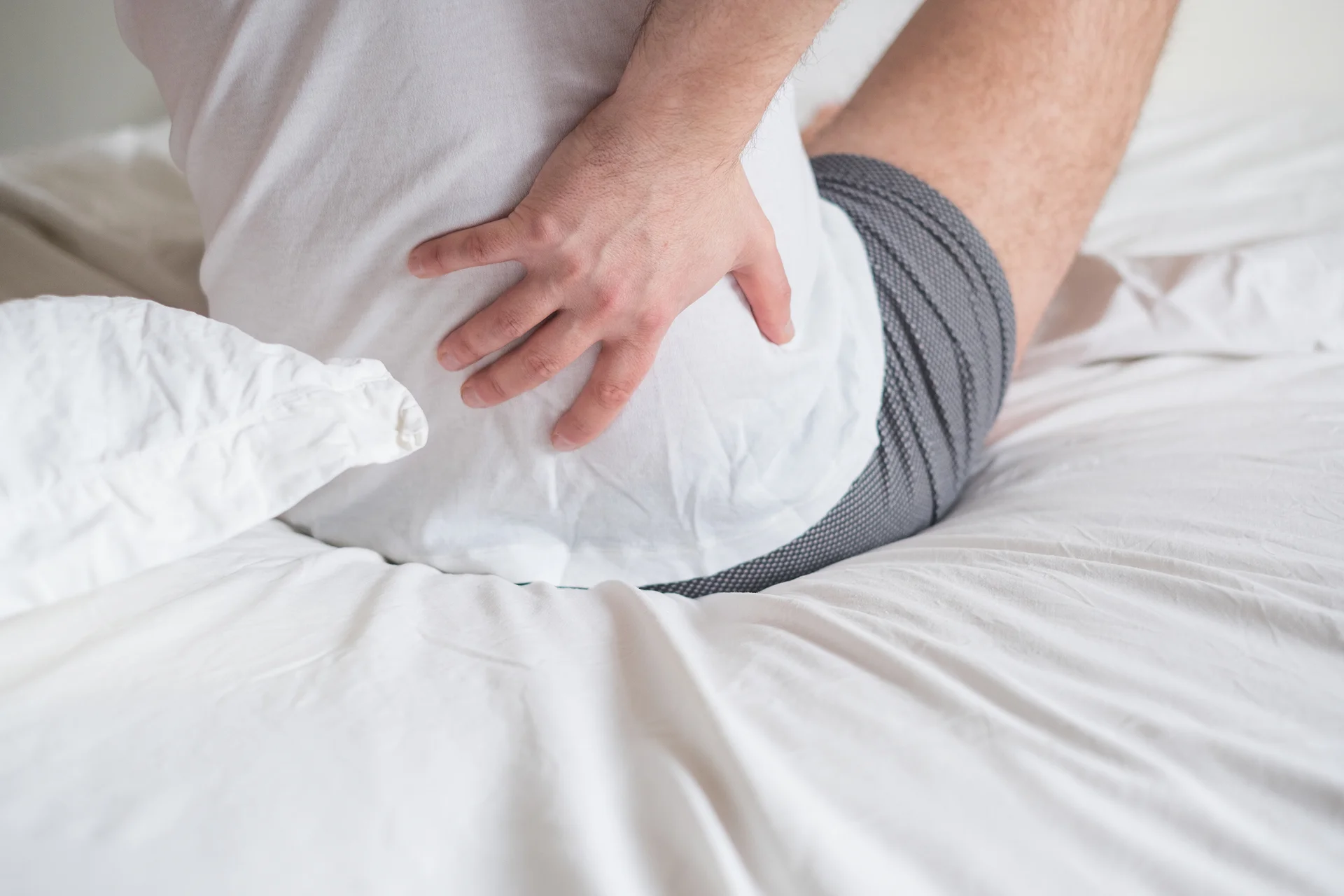Here at Kaly, we specialize in providing comprehensive information and resources for managing chronic back pain. Our team of experts includes physicians, physical therapists, and healthcare professionals who have years of experience treating various causes of back pain, including hernias.
In this post, we’ll walk you through the connection between hernias and back pain, how to identify if your back pain may be caused by a hernia, and what you can do about it.
Feeling a Pain in Your Back? It Could Be a Hernia
Back pain can have many causes, from muscle strains to arthritis to spinal issues. But could a hernia be to blame for your aching back? Surprisingly, different types of hernias can cause referred pain that radiates into the back.
While hernias most commonly cause pain around the bulge itself, they can also irritate nerves far from the site, leading to discomfort in other areas. For some people, these remote pain patterns end up centering in the back.
Can a Hernia Cause Pain in the Back?

What exactly is a hernia? A hernia occurs when an organ or tissue squeezes through a weak spot or tear in the wall of muscle or tissue that normally contains it.
Hernias often form in the abdominal wall, but they can also develop around the upper thigh, belly button, and diaphragm. Common types include:
- Hiatal hernia – part of the stomach protrudes through the diaphragm into the chest
- Inguinal hernia – tissue bulges through the abdominal wall into the groin
- Umbilical hernia – abdomen contents protrude through abdominal wall near the belly button
- Femoral hernia – lump forms in the upper thigh/groin area
When a hernia first develops, you may feel no symptoms at all. But over time, the protruding tissue can press on nerves, leading to inflammation and pain.
This discomfort most often occurs around the hernia itself. However, some people also experience referred pain in other areas of the body. Referred pain means you feel pain at a location different from the source.
How Hernias Can Refer Pain to the Back
For example, an inguinal hernia can irritate nerves that run from the groin down the leg. You’ll likely feel pain in the groin, but you may also have radiating aches down the thigh.
In some cases, referred pain from a hernia ends up causing back pain. Why does this happen?
Your nerves connect to your spinal cord, forming a complex network throughout the body.
Irritation of nerves in one area can travel along these neural pathways, manifesting as pain elsewhere.
Referred back pain often follows specific patterns depending on the location of the originating hernia:
- Hiatal hernia – can refer pain to the middle or upper back
- Inguinal hernia – can cause lower back pain
- Umbilical hernia – may lead to pain in the lower back
How Common Is Hernia-Related Back Pain?
However, it is important to note that most hernias do not cause back pain. Studies show:
- Only about 15% of people with hiatal hernia experience back pain
- Just 5-10% of patients with inguinal hernia report related lower back pain
So while referred back pain is a possible complication, it is relatively uncommon. Make an appointment with your doctor if you regularly have back pain that may be connected to a hernia. They can properly examine you and determine treatment options.
What Causes a Herniated Disc in the Back?

Herniated discs in the spine can also lead to significant back pain. But what exactly causes discs to herniate?
Your backbone is made up of small bones called vertebrae that stack to form the spinal column. Between each vertebrae sits a rubbery spinal disc that acts as a cushion.
These discs have a tough outer layer and a soft gel-like inner core. A herniated disc occurs when the inner material pushes out through a weak spot or tear in the outer later.
When this inner disc material bulges out, it can press on spinal nerves, causing numbness, weakness, and sharp back pain.
Risk Factors for Herniated Discs
A variety of factors can raise your risk of developing a herniated disc, including:
- Injuries – trauma from a car accident, fall, or sports injury can cause discs to herniate.
- Improper lifting – using poor form when lifting heavy objects stresses the discs.
- Age-related changes – discs lose flexibility and resilience with age.
- Genetics – some people inherit susceptible disc tissue.
- Being overweight – excess weight puts added pressure on the spine.
- Sedentary lifestyle – lack of core strength increases risk.
- Smoking – smokers have higher rates of herniated discs.
- Diseases – conditions like arthritis make discs more fragile.
As you can see, herniated discs often result from a combination of lifestyle factors and age-related wear and tear. Using proper lifting techniques and maintaining core strength through exercise can help protect your back.
When Should I See a Doctor for Hernia Back Pain?
If you regularly experience back pain and suspect it may be linked to a hernia, make an appointment to see your physician. They can examine your back and abdomen for signs of a hernia.
Red flags to watch for include:
- Severe or worsening pain
- Weakness or numbness in your legs
- Bowel or bladder changes
- Coughing makes the pain worse
- Bulge around the abdomen or groin
Possible Symptoms of a Hernia
| Symptom | Description |
| Bulge | Visible protrusion of tissue near hernia site |
| Pain | Ache, discomfort around the hernia |
| Referred Pain | Radiating pain in other areas like the back |
| Numbness/Tingling | From nerve compression by the hernia |
| Weakness | In the muscle/limb near the hernia |
| Bowel/Bladder issues | From pressure on related nerves |
Your doctor will likely order imaging tests like a CT scan or MRI to confirm the presence and location of a hernia. This will help guide treatment recommendations.
Small hernias often don’t require treatment beyond pain management. But larger or worsening hernias may need surgical repair to prevent potentially dangerous complications.
Repair procedures are usually done laparoscopically on an outpatient basis. Recovery time is typically 2-4 weeks.
Seeking prompt medical care is important if you notice signs of a possible hernia, like unexplained back pain combined with symptoms around your chest or groin area.
Our Experienced Team Can Help

At Kaly, our team includes specialists who excel at accurately diagnosing the root cause of back pain. We’ll perform a thorough physical exam and may order imaging tests to pinpoint if a hernia is responsible for your pain.
Based on the location, size, and severity of the hernia, we’ll recommend the most effective treatment options. This may include medication, ice/heat therapy, specialized exercises, lifestyle changes, or possibly surgery for large or painful hernias.
Don’t Let Back Pain Hold You Back
If chronic back pain has become an unwelcome companion, you don’t have to just live with it. Take the first step and reach out to Kaly today. Our experts are ready to help you pinpoint the source of your pain and craft a tailored treatment plan so you can get back to living your life.
